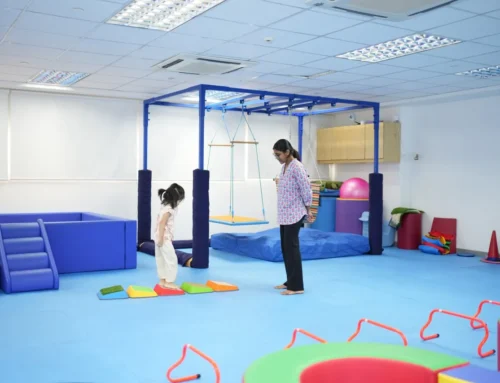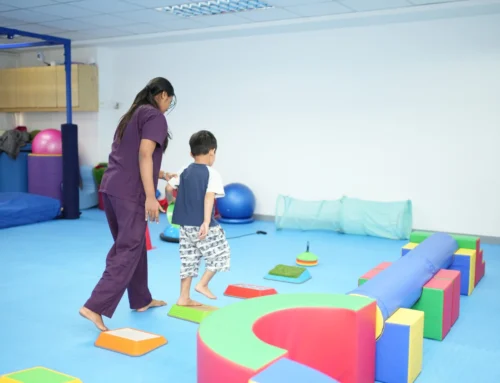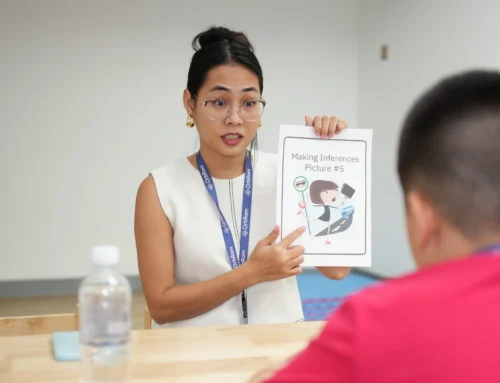For many children in Cambodia, starting a task or following through with daily routines can be a real challenge. Whether it’s beginning homework, getting ready for school, or transitioning between classroom activities, these moments often depend on executive functioning skills such as task initiation and planning. At OrbRom Center in Phnom Penh, our occupational therapy programs use visual supports and structured schedules to help children understand expectations, organize their actions, and build independence — both at home and in the classroom.
Why Task Initiation and Planning Matter
Task initiation refers to the ability to start a task without undue delay, while planning involves identifying the steps needed to complete that task successfully. These are vital components of executive functioning, the cognitive system that helps children manage time, organize materials, and complete multi-step activities.
When children have weak task initiation and planning skills, they might appear unmotivated, distracted, or forgetful. However, the issue is rarely motivation — it’s about understanding what to do first and how to move forward. Occupational therapy provides concrete tools, like visual schedules and step-by-step supports, to make these invisible skills visible and teachable.
To understand how these interventions connect to executive functioning, visit Building Focus and Executive Functioning Through Occupational Therapy in Phnom Penh.
How Visual Supports Help Children Get Started
1. Visual Schedules Create Predictability
Visual schedules use pictures, icons, or words to outline a sequence of daily activities — for example, “circle time → snack → playground → reading.” For many children, especially those with autism or ADHD, predictability reduces anxiety and helps them transition between tasks calmly.
At OrbRom Center, therapists create customized visual schedules that match each child’s literacy level and environment. In Cambodian classrooms, these schedules are often posted on the wall or placed in the student’s folder, allowing them to reference what’s next without needing constant reminders from teachers.
Learn more about setting up supportive learning spaces in How to Set Up a Sensory-Friendly Classroom for Special Needs Students.
2. First-Then Boards Encourage Motivation
A “First-Then” board is one of the simplest visual supports used in occupational therapy. It shows that after completing one activity (e.g., “First: Write your name”), the child gets to do something enjoyable (“Then: Play with blocks”). This visual reminder helps with task initiation by linking effort with reward, encouraging students to begin even when the activity feels challenging.
These visual tools are also used in homes across Phnom Penh, giving parents an easy way to support routines like brushing teeth, packing school bags, or completing homework.
Building Planning Skills Through Visual Organization
1. Step-by-Step Task Cards
Occupational therapists often break complex activities into smaller, manageable steps using visual task cards. For instance, a “Get Ready for School” card set might include pictures of putting on clothes, eating breakfast, and packing supplies.
These visuals teach sequencing — the ability to understand what comes first, next, and last — a crucial element of planning. Over time, children begin to internalize these steps, needing fewer prompts and showing greater independence.
Explore more about developmental sequencing and structure in The Role of Fine Motor Skills in Child Development: How Occupational Therapy Can Help.
2. Weekly and Daily Planners for Older Children
For school-aged students, occupational therapists introduce simple planners or visual calendars to support academic organization. These help children record assignments, track due dates, and plan ahead.
In Cambodian classrooms, where students often juggle multiple subjects and languages, visual planners help reduce cognitive overload by showing what needs to be done — and when. The result is less stress, better time management, and smoother transitions between lessons.
Integrating Visual Supports in Phnom Penh Classrooms
At OrbRom Center, therapists often collaborate with teachers to incorporate visual supports and schedules into classroom routines. For example:
-
Teachers use color-coded charts to identify activity areas.
-
Students receive personalized mini-schedules on their desks.
-
Group activities are introduced with visual cue cards showing steps and goals.
These strategies allow students with learning differences to participate meaningfully alongside their peers. Teachers also report fewer behavior issues and smoother transitions, as children become more confident in knowing what comes next.
For guidance on creating a supportive learning environment, explore Occupational Therapy in Phnom Penh: Building Fine Motor Skills in Young Children.
Personalized Occupational Therapy at OrbRom Center
Every visual support plan at OrbRom Center is individualized. Therapists first assess a child’s strengths and needs through professional assessments, then design visual tools that fit their developmental level and daily environment. Parents are also trained on how to use these visuals at home for consistency and reinforcement.
Many families combine occupational therapy with speech therapy or special needs intensive intervention to address broader communication, sensory, and behavioral goals. This holistic approach helps children build not only structure but also confidence in their ability to manage everyday tasks.
Conclusion: Empowering Independence Through Structure and Clarity
Using visual supports and schedules is one of the most effective ways to improve task initiation and planning in children. When routines are predictable and expectations are clear, children feel empowered to take action on their own. At OrbRom Center in Phnom Penh, occupational therapy turns visual tools into powerful stepping stones toward independence, organization, and lifelong learning success.
To learn how your child can benefit, visit our Occupational Therapy page or contact OrbRom Center for a personalized consultation.
We are the only Preschool specialized on children with special needs in PhnomPenh.
- Internationally qualified teachers
- Cambodia’s largest sensory room
- Outdoor swimming pool
- Covered outdoor playground
📞 Phone: 077.455.993
Telegram Link: https://t.me/OrbRom





